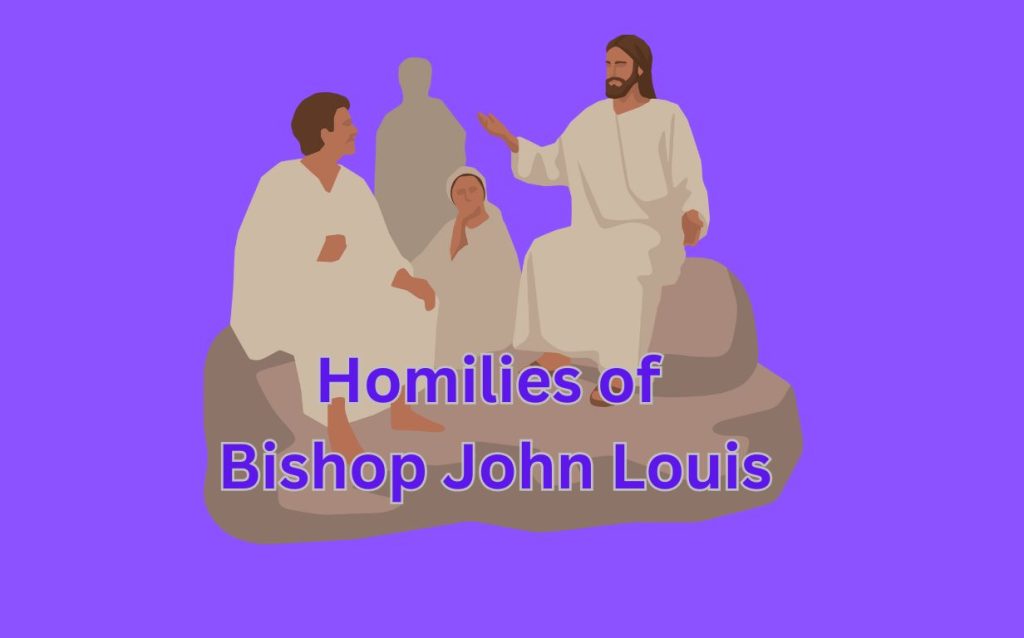THEME: BEARING WITNESS TO JESUS AS THE SAVIOUR
READINGS: Isaiah 61:1-2, 10-11/ 1 Thessalonians 5:16-24/ John 1:6-8, 19-28
3rd Sunday of Advent
Beloved, as we prepare to celebrate the birth of our Lord and Saviour, Jesus Christ, we are reminded that at His first coming, many of His own people rejected Him, and consequently, missed the ultimate blessing of salvation. However, those who did accept Him and bore witness to Him were saved (cf. John 1:1-18). We are, therefore, exhorted to bear witness to Jesus as the Saviour of the world. In this homily, St. John the Baptist is presented to us an excellent example of bearing witness to Jesus as the Saviour.
The rejection of Jesus at Nazareth
According to today’s first reading, God would save His people through His chosen and Anointed One (cf. Isaiah 61:1-2). The Greek word for the “Anointed One” is translated into English as “Christ”. Once, when Jesus Christ visited Nazareth, He took the scroll of the Prophet Isaiah and read the above passage. He then remarked that the prophecy was fulfilled in Him. That is, He was the One the Father had anointed to save us. Unfortunately, His people would not believe Him (cf. Luke 4:16-21).
John the Baptist declared Jesus as the Saviour
In contrast to the people who rejected Jesus, John the Baptist bore witness to the fact that Jesus was the Anointed One sent by God to save us (cf. John 1:6-8, 19-28). Like John, we all have the obligation to bear witness to Jesus Christ as the Saviour. Thus, the Lord tells us: “whoever confesses Me before men, him I will also confess before My Father who is in heaven. But whoever denies Me before men, him I will also deny before My Father who is in heaven” (Matt. 10:32-33).
From the conception, life, ministry and death of John the Baptist, we learn the following lessons about bearing faithful witness to Jesus Christ:
We should believe in our calling to bear witness to Jesus Christ
John strongly believed that God called him, even before he was born, to bear witness to Jesus Christ. This strong conviction made John steadfast in all circumstances. Beloved, like John, God called us before our births to be witnesses of Christ. This is evident in God’s message to Jeremiah when the prophet was reluctant to accept his calling: “Even before I formed you in the womb I have known you; even before you were born I had set you apart and appointed you a prophet to the nations” (Jer. 1:4-5). This applies not only to Jeremiah and John but to all of us (cf. Psalm 139:13-15).
The role of parents in nurturing our sense of mission to bear witness
John’s mission was so special that his mother’s womb remained barren until the appointed time of his birth. It was as if God planned that no one else was to use the “room” (Elizabeth’s womb) reserved for the great prophet. Thus, destined to carry out a special mission, John was conceived when his parents (Zechariah and Elizabeth) least expected it (cf. Luke 1:5-25). Secondly, it was the angel Gabriel who announced the name “John”– a name unusual in his family – even before he was born (cf. Luke 1:13, 60-61). Thirdly, even before John was conceived, God had declared that he should never take wine or strong drink, but rather he would be filled with the Holy Spirit (cf. Luke 1:15).
John’s parents certainly nurtured him to appreciate the special circumstances of his conception, birth, naming and the special mission God had entrusted to him. Similarly, parents should bring up their children to cherish their faith in Christ and to bear witness to him.
Personal preparation for credible witness
Besides his upbringing, John had to prepare himself to become a credible witness to Christ. For instance, John went to the desert to prepare through prayer and fasting. By so doing he submitted himself to the Spirit of God (cf. Luke 1:80). Secondly, he led a simple life: consider his place of abode, dressing and the type of food he ate. Thirdly, no strong drink ever touched his lips, in accordance with God’s instruction.
Similarly, we should often create our “desert space” of silence in God’s presence to pray and meditate on Scriptures. Secondly, we should practice penance and embrace a lifestyle pleasing to the Lord. Thirdly, to fulfill our specific mission, we should identify our vocations by discovering our interests and talents, and by developing and using them in ways which bring glory to God and benefits to society.
Witnessing with integrity
John could have taken advantage of the false expectation of the Jews. Many of them taught John was the Christ. However, being a man of integrity who was focused on the mission God had entrusted to him, he denied being the Christ and stated that he was a mere messenger sent to prepare the way for the Christ, whose status was far higher: “I am not the Christ …. I baptize with water, but there stands One among you whom you do not know. It is He who, coming after me, is preferred before me, whose sandal strap I am not worthy to loose” (John 1:20, 26-27).
So focused was John on his mission that not even the real threat of death would shake his resolve to bear witness to Christ. Thus, he will bear the ultimate witness with his death at the hands of King Herod (cf. Matt. 14:1-12). Beloved, like John, let us witness to Christ with integrity even to the point of martyrdom.
Conclusion
May the Spirit of God continue to strengthen our resolve to witness to Jesus Christ as the Saviour of the world! May our witnessing by words and deeds be steadfast and authentic in all circumstances! Ultimately, may we enjoy the blessing of eternal life with John the Baptist and all the saints. Amen!
By Most Rev. John Kobina Louis
